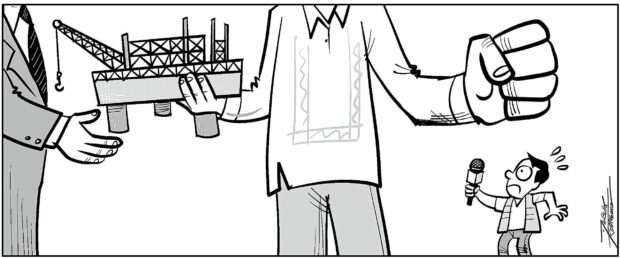Profound public interest issue

For fulfilling their duty to report on matters of abiding national significance, 21 journalists, editors, and executives of seven news organizations were unexpectedly slapped last Nov. 29 with multiple libel and cyberlibel suits by Energy Secretary Alfonso Cusi and Davao-based billionaire Dennis Uy.
Their supposed crime? Publishing “libelous and false statements” about Cusi and Uy’s involvement in the controversial multibillion-dollar sale of a combined 90-percent stake in the Malampaya gas field project to the Uy-led Udenna group.
Geologist Balgamel Domingo and US-based Filipinos Rodel Rodis and Loida Nicolas Lewis alleged in a 42-page complaint filed last Oct. 18 at the Office of the Ombudsman that Cusi had conspired with private and public officials to give “unwarranted benefits, advantage or preference to Udenna,” ultimately allowing the group led by Uy, a personal friend of President Duterte and one of his biggest campaign donors in 2016, to secure a 90-percent stake in Malampaya under a two-tranche deal.
The criminal complaint at the Ombudsman was obviously major news, and the published articles that reported on it were not plucked from thin air, but rather from information gleaned from the graft complaint — a public document — as well as a press conference and a statement issued by the complainants.
Media outlets ensured basic fairness by devoting space to Uy and Cusi’s side, who both insisted that the deal was aboveboard and that any allegations that the agreement was crooked, especially those made by Senate committee on energy chair Sen. Sherwin Gatchalian, were “misguided, lacking in factual and legal basis.” Cusi, who chairs a faction of the divided administration party, was also quoted as claiming that the complaint was made “for the singular purpose of political propaganda.”
But, in his libel suits filed in Taguig City, the energy chief said that by reporting on the Oct. 18 charges, the journalists had already “publicly accused” him of graft, thus smearing his “reputation and good standing in government.” For that, Cusi is demanding P200 million in damages from each of the seven media outfits — “to send a strong message that there is a fair and humane way to settle misunderstanding and differences without resorting to malicious news reporting.”
One is hard-pressed to be sympathetic to a public official bearing this mindset. The journalists and media outlets were merely doing their job to report on a legal challenge lodged against one of the biggest and possibly most impactful deals entered into by the Duterte administration.
The “profound level of public interest in the issue,” as pointed out by the statement of the Foreign Correspondents Association of the Philippines condemning the multiple libel suits, is clear: Malampaya is a “critical infrastructure that supplies a fifth of the Philippines’ energy requirements and benefits millions of Filipinos and businesses.” Thus, basic scrutiny and due diligence on where this key national asset goes, and utmost transparency in how it changed hands to end up with a businessman closely associated with the President, are more than required. It is Cusi’s job to explain to the public the nature and fine print of the deal that bears his signature in the Filipino people’s name; instead, he has chosen to try to shut down news coverage of the issue by hauling journalists to court.
Rodis et al.’s call for accountability in the Malampaya transfer is, in any case, not an isolated demand deserving to be ignored. Various civic groups have likewise voiced concerns over the integrity of the deal — among them the Integrated Bar of the Philippines (which urged the Department of Energy to “exercise transparency in evaluating transactions” related to Malampaya), the Makati Business Club (the Senate, it said, should determine why the government did not exercise its right to buy the private sector’s shares when they became available, and instead allowed the Uy group to take over sans any experience in oil exploration and development), the Philippine Bar Association (“Malampaya is a crown jewel of the country’s energy infrastructure,” it noted; “That it ended up in the hands of an entity that is not technically or financially sound is beyond negligent, it is criminal”), and, not least, Gatchalian’s Senate committee.
Gatchalian has described the mammoth transaction as a case of “lutong macau” — the most damning appraisal yet of the deal. But Cusi chose the easier target, training his incensed eyes on the media and not the public official leading the charge against his pet agreement.
The Economic Journalists Association of the Philippines, just one of several media groups that spoke up to denounce Cusi’s move, can’t be faulted for characterizing the libel charges as naked “harassment suits meant to intimidate the press.” All in a day’s work for Philippine media.















